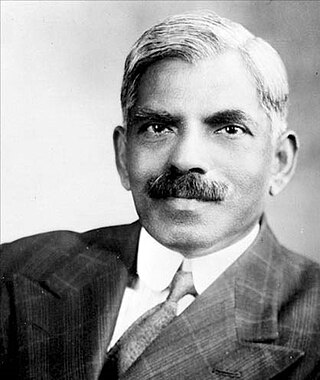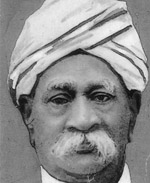
George Joachim Goschen,2nd Viscount Goschen,,was a British Conservative politician who served as Governor of Madras from 1924 to 1929,and acting Viceroy of India from 1929 to 1931.
The Justice Party,officially the South Indian Liberal Federation,was a political party in the Madras Presidency of British India. It was established on 20 November 1916 in Victoria Public Hall in Madras by Dr C. Natesa Mudaliar and co-founded by T. M. Nair,P. Theagaraya Chetty and Alamelu Mangai Thayarammal as a result of a series of non-Brahmin conferences and meetings in the presidency. Communal division between Brahmins and non-Brahmins began in the presidency during the late-19th and early-20th century,mainly due to caste prejudices and disproportionate Brahminical representation in government jobs. The Justice Party's foundation marked the culmination of several efforts to establish an organisation to represent the non-Brahmins in Madras and is seen as the start of the Dravidian Movement.

Seshadri Srinivasa Iyengar CIE,also seen as Sreenivasa Iyengar and Srinivasa Ayyangar,was an Indian lawyer,freedom-fighter and politician from the Indian National Congress. Iyengar was the Advocate-General of Madras Presidency from 1916 to 1920. He also served as a member of the bar council from 1912 to 1920,the law member of Madras Presidency from 1916 to 1920 and as the president of the madras province Swarajya Party faction of the Indian National Congress from 1923 to 1930. Srinivasa Iyengar was the son-in-law of renowned lawyer and first Indian Advocate-general of Madras,Sir Vembaukum Bhashyam Aiyangar. Iyengar's followers called him Lion of the South.

Paramasivan Subbarayan was an Indian politician,freedom fighter and diplomat and was the First Minister of Madras Presidency,India's ambassador to Indonesia and Union Minister of Transport and Communications in Jawaharlal Nehru's government. He was the father of General P. P. Kumaramangalam,who served as India's Chief of Army staff,and of politician Mohan Kumaramangalam. He was also the grandfather of INC and BJP politician and Union Minister Rangarajan Kumaramangalam.
Raja Sri Ravu SvetachalapatiSir Ramakrishna Ranga RaoKCIE was an Indian politician and zamindar who served as the First Minister of Madras Presidency from 5 November 1932 to 4 April 1936 and 24 August 1936 to 1 April 1937.

Raja Sir Panaganti RamarayaningarKCIE,also known as the Raja of Panagal,was a zamindar of Kalahasti,a Justice Party leader and the First Minister of Madras Presidency from 11 July 1921 to 3 December 1926.

SirArcot Ramasamy Mudaliar was an Indian lawyer,diplomat,and statesman who was the first president of the United Nations Economic and Social Council and the 24th and last dewan of Mysore. He also served as a senior leader of the Justice Party and in various administrative and bureaucratic posts in pre- and Independent India. He was a prominent orator and was known for his inspiring speeches.

Dr. C. Natesa Mudaliar (1875–1937),also known as Natesan,was an Indian politician and activist of the Dravidian Movement from what is now the Indian state of Tamil Nadu. He was one of the founders of the Justice Party,along with P. Theagaraya Chetty and Dr. T. M. Nair. He is often mentioned as Dravida Thanthai.
Arcot Ranganatha Mudaliar was an Indian politician and theosophist from Bellary. He served as the Minister of Public Health and Excise for the Madras Presidency from 1926 to 1928.

The second legislative assembly election for the Madras Presidency after the establishment of a bicameral legislature by the Government of India Act of 1935 was held in 1946. The election was held after 6 years of Governor's rule starting from 1939,when the Indian National Congress government of C. Rajagopalachari resigned protesting Indian involvement in World War II. This was the last election held in the presidency - after Indian independence in 1947,the presidency became the Madras state. The election was held simultaneously with that of the Legislative Council. The Congress swept the polls by winning 163 out of 215 seats. The years after this election saw factionalism in Madras Congress party with divisions across regional and communal lines. Competition among T. Prakasam,C. Rajagopalachari and K. Kamaraj resulted in the election of Prakasam as the prime minister initially. But he was later defeated by Omandur Ramaswamy Reddiar with Kamaraj's support. In turn,Reddiar himself was ousted to make way for P. S. Kumaraswamy Raja with the support of Kamaraj.

The first legislative assembly election for the Madras Presidency was held in February 1937,as part of the nationwide provincial elections in British India. The Indian National Congress obtained a majority by winning 159 of 215 seats in the Legislative Assembly. This was the first electoral victory for the Congress in the presidency since elections were first conducted for Madras Legislative Council in 1920. The Justice Party which had ruled the presidency for most of the previous 17 years was voted out of power. The assembly was constituted in July 1937 and C. Rajagopalachari (Rajaji) became the first Congress Prime Minister of Madras.

The first legislative council election to Madras Presidency after the establishment of dyarchical system of government by the Government of India Act 1919,was held in November 1920. Indian National Congress boycotted the election due to its participation in the Non-cooperation movement. The election occurred during the early stages of non-Brahmin movement and the major issue of the election was anti-Brahminism. Justice party won the election with no significant opposition and A. Subbarayalu Reddiar became the inaugural First Minister of the presidency.

The third legislative council election to Madras Presidency after the establishment of dyarchical system of government by the Government of India Act,1919,was held in November 1926. Justice party lost the election to Swaraj Party. However,as the Swaraja Party refused to form the Government,the Governor of Madras set up an independent government under the leadership of P. Subbarayan and with the support of nominated members.

The fourth legislative council election to Madras Presidency after the establishment of dyarchical system of government by the Government of India Act,1919 in September 1930. Justice party won the election and P. Munuswamy Naidu became the first First Minister. The main opposition party - Swaraj Party did not contest the elections due to its participation in the Civil Disobedience Movement.
The first legislative council election for the Madras Presidency after the establishment of a bicameral legislature by the Government of India Act of 1935 was held in February 1937. The Indian National Congress obtained a majority by winning 27 out of 46 seats in the Legislative Council for which the elections were held. This was the first electoral victory for the Congress in the presidency since elections were first conducted for the Council in 1920 and C. Rajagopalachari (Rajaji) became the Prime Minister. The Justice Party which had ruled the presidency for most of the previous 17 years was voted out of power. Congress also won the Legislative assembly election held simultaneously.
C. Rajagopalachari was the Prime Minister of the erstwhile Madras Presidency and the Chief Minister of Madras State of Independent India. He was the first Indian National Congress member to assume office in Madras Presidency. He served as the head of government for two terms spanning about five years. He was elected as a Prime Minister after 1937 elections in Madras Presidency and served till 1939. He was also the Chief Minister of Madras State after first elections held after Indian independence. His second term lasted from 1952 till 1954.

In the fifth legislative council election to Madras Presidency after the establishment of dyarchical system of government by the Government of India Act,1919 the ruling Justice party lost the election and the opposition Swaraj Party emerged as the single largest party. However,it refused to form the government,due to its opposition to dyarchy. The incumbent First Minister,Raja of Bobbili retained power and formed a minority government.
Diwan Bahadur Royapuram Nallaveeran Arogyaswamy Mudaliar was an Indian politician and civil engineer who served as the Minister of Excise,Medical Administration and six other departments in the Madras Presidency from 1926 to 1928.
The Indian independence movement had a long history in the Tamil-speaking districts of the then Madras Presidency going back to the 18th century.











